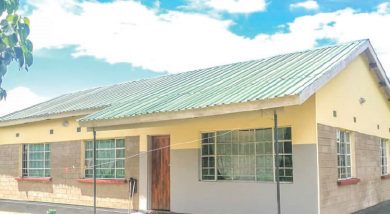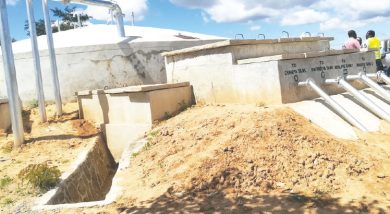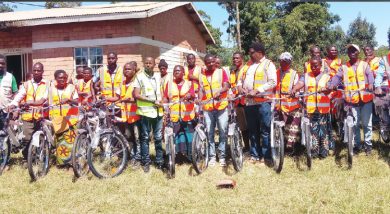IMF queries input Subsidy, zero-tax
The International Monetary Fund ( IMF ) h a s expressed concern with the Tonse Alliance administrations
implement a t ion of the Affordable Inputs Programme (AIP) and adjustment of the zero-tax bracket from K45 000 to K100 000.
In its latest Rapid Credit Facility (RCF) Report on Malawi, the IMF said its concern on the ambitious AIP that targets 4.2 million smallholder farmers to access subsidised inputs is premised on the programme’s “narrow” focus on maize. It has since proposed reforms to enhance the programme’s efficiency and effectiveness.
On the other hand, the fund said it “strongly advised” Malawi authorities against the doubling of the zero-tax rated bracket from K45 000 to K100 000, saying the popular
measure was “regressive” and will disproportionately benefit the wealthy. 000, saying the popular Reads the IMF report: “Staff supports the objective of supporting v ulnerable rural households to alleviate poverty and food insecurity…

“Staff also expressed concerns over the narrow focus of the programme on maize as opposed to the Fisp [Farm Input Subsidy Programme] which also supported other crops.”
With the AIP, the Tonse Alliance administration targets to reach four times more beneficiaries than Fisp. The 4.2 million smallholder farming households will each access two bags of fertiliser weighing 50 kilogramme (kg) each at K4 495 per bag and five kg certified seed at K2 000 per pack.
In the K2.2 trillion National Budget, AIP is allocated K160 billion of the K245 billion allocation for the mainstay agriculture sector, representing a 78 percent increase from the K36 billion allocation in the terminated Fisp.
But Ministry of Agriculture spokesperson Gracian Lungu on Monday explained that unlike Fisp which was using funds from donors to subsidise legumes’ prices, in the AIP arrangement government decided to focus much on cereals due to financial constraints.
He said the programme is leaning heavily on maize because it was Malawi’s staple grain. He said other cereals such as rice were also supported.
Said Lungu: “With the number of beneficiaries increased from about 900 000 under Fisp to 4.2 million, the suppliers of legumes were overwhelmed as their stock could not tally with the over 4.2 million packs of legume seeds that were needed.”
On biometric system, he said the ministry in conjunction with National
Registration Bureau (NRB) cleaned up 97 percent of 4.2 million beneficiaries’ database and that the remaining three percent was expected to be cleaned by end of next
But IMF said it welcomed the arrangement to administer the programme using electronic vouchers based on a farmer registry linked to the NRB’s national identification (ID) system as it provides transparent targeting mechanism while ensuring good governance.
However, the fund warned that the programme has associated risks in an event that the farmer registry and the national ID system were not sufficiently
linked.
On the widening of the zero-rated pay as you earn (Paye) threshold to K100 000 which has stirred excitement, the IMF said its staff strongly advised against the same.
Reads the repor t: “Instead, it [IMF team] encouraged the authorities to consider adjustments to the personal income tax rate schedule that increase progressivity of income taxation and partially recoup the intended revenue loss; broader use of tax deferrals and less frequent filing with a view to support businesses.”
While opting not to comment on AIP, IMF country representative Farayi Gwenhamo briefly said in an e-mail interview on Monday: “The Mid- Term Budget Review will need to look into these matters closely and find measures to address the
pressure on the public sector wage bill.”
In an interview yesterday, Ministry of Finance spokesperson Williams Banda said the new administration plans to review any programme that is currently being implemented to ensure efficiency.
He said: “The new government promised its people an increase in disposable income and reduced tax burden by raising the zero tax band from K45 000 to K100 000 and the promise has been delivered.
“The fiscal impact [of such an adjustment] has been documented and government is working on measures to mitigate on the impact of revenue loss.”
Commenting on AIP, National Association of Smallholder Farmers in Malawi (Nasfam) chief executive officer Betty
Chinyamunyamu on Monday said her association appreciated that for this year, there was not enough time or extensive consultations to ensure robust planning for AIP.
But she expressed hope that government will start engaging various stakeholders to address critical issues such as crop choices, insurance for the programme, registration of beneficiaries and implementation.
Recently, Nasfam, through its consultants, recommended to Capital Hill to consider re-allocating resources from low impact programmes within the agriculture sector such as the AIP, to other high impact programmes which are underfunded such as livestock, research and extension services.
Speaking during the official launch of the AIP at Pirimiti Boys Primary School in Zomba on October 17 2020, President Lazarus Chakwera described the AIP as an injection that would drive and transform the country’s economy.
Former president Bingu wa Mutharika, whose government initiated Fisp in 2005, faced similar reservations and criticism from the IMF and the World Bank when he rolled out the programme to boost food security. However, he defied them and proceeded to implement the programme





